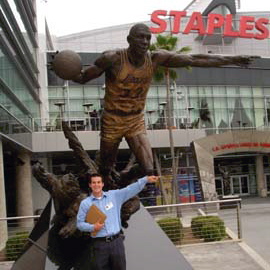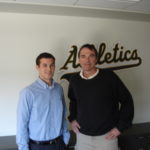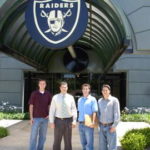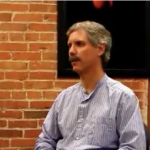Interview: How To Become an Account Executive
Cory Shakarian is an Account Executive for the Los Angeles Clippers, after working for ten years with the San Francisco Giants. He has only been with the organization for a couple of months now and is getting a feel for the culture and how things are done around Staples Center. His ultimate goal is to climb the ladder to a management position within the Clippers organization.
Originally from Northern California, Cory got away from the laid back California lifestyle when he attended the University of Michigan, the same college where his parents met, and where his grandfather played football with former President Gerald Ford. With this family history, and being an athlete himself in high school, Cory’s appetite for sports would be satisfied by Michigan’s “Big House” and the infamous “Fab Five” Men’s basketball team. He decided to walk onto the baseball team where he played for the first two years at the Division I level. He obtained his degree in Sports Management and Communication. He admitted that his degree was a very good choice for people who want to work in sports.
The summer of his senior year, Cory traveled to Florida to be with his Dad. Once there, he obtained an internship with the Florida Marlins baseball team. This was his introduction to professional sports. After that summer he graduated from Michigan and returned to Northern California, where he worked for Smith Barney cold-calling for brokers. He did that for about a year and realized that sports was more of his style of work. He began networking with people he knew and was able to get informational interviews with all of the major sports teams in the Bay Area. Each one had a small window of opportunity, and at 23 years old Cory accepted a position with the Giants making $10 an hour. His responsibilities included answering phones and servicing accounts.
He did that for about ten months before he was hired on full time. Cory said that although the job caused him to go into a little bit of debt for a while, that it was the stepping-stone into his career in the sports industry.
“Communication is the most important skill that I took away from my degree. Public speaking to five or ten people about ideas you have is important. Also being able to write a marketing piece is crucial.”
“Internships are important. My internship was key for me landing a job later on. While you’re in school I’d highly recommend that you get an internship because after you graduate you’d like to earn a salary. How do you get the internship? You just network, talk to your family and friends in your hometown to ask them if they know of anybody.”
“When I interviewed with an executive from the Oakland A’s, he told me people have to be willing to sacrifice, and that’s financially. He said that you have to come into the organization with the attitude that you’d be willing to pay someone for the right to work in their organization. School doesn’t teach you how to work in a professional organization, but getting work experience does.”
Interview
I’m a northern California kid. I do business in sports sales. All you have to worry about in this business is getting to and from the venue. Everything we do is on the phone. All of our business is conducted on the phone.
I’m an account executive with the Los Angeles Clippers. Sales person, basically. I have a lot more experience than that. I have 10 years of experience. I did group sales with the San Francisco Giants. Group sales is large amount so tickets.
I took this job here because I moved to LA for my girlfriend. I took this job for management opportunity supposedly coming up pretty quickly. Right now I’m selling like everyone else. I’m getting to know things and I’m talking to the Director of Sales, and the VP, and the President about how the Clippers can do more and better business.
I went to the University of Michigan. My grandfather played football there with Gerald Ford back in the 30’s. I walked on to the baseball team and made the practice squad. The Fab 5 basketball team was there when I was there. As soon as I graduated I got the hell out of Michigan. Not great winters there.
Basically I took a job making $10 an hour with the Giants. I worked in that job for ten months before I was hired on full time. I went into serious debt but I bit the bullet and got the experience I needed and it was the stepping stone to getting my career started in sports. I stayed with the Giants for almost ten years after making $10 an hour on the phone.
Sports is an emotional roller coaster of a business. When you’re selling in sports, you try to separate the emotion side of it and you’re trying to sell the fan experience. Not so much the winning and losing. But my best times are when we’re winning. October 2002 was one of the best months of my life. I went to all 7 World Series games.
My internship was key to me getting a job later on. When you graduate, you’re trying to earn a salary.
I when to an interview the Oakland A’s and met with this guy. He said, ‘To work in sports, people have to be willing to sacrifice. Mostly, that’s financial sacrifice. You have to be coming in with the attitude that you’re willing to pay somebody for the right to work in their organization.’ He was politely telling me that you have to sacrifice to get into sports. I’ll never forget that he actually said I had to pay someone to work for them. But there’s no shame in taking an unpaid internship in sports.
There’s a lot of perks. I’m 34 right now. A lot of my friends make more money than I do. But I’m okay with that because of the perks. You get tickets anywhere you go. My office is an arena. Here we are in the Staples Center. This is the office that I work in. That’s a pretty nice perk.

You do sacrifice a little bit money. But the sacrifices are worth it because I love sports. Enjoying the highs and lows of sports is fun. Whether the team wins or loses determines how you do the next day at work. It’s fun.
You have to hear the words many, many times to get a thick skin. Sales is about rejection. It’s kind of like baseball. A good hitter fails seven out of ten times. Ticket sales, you probably fail nine out of ten times. But if you’re persistent and keep going at it, you’re going to succeed. Every time you do make a sale it encourages you to keep going. You have to be able to deal with that failure.






